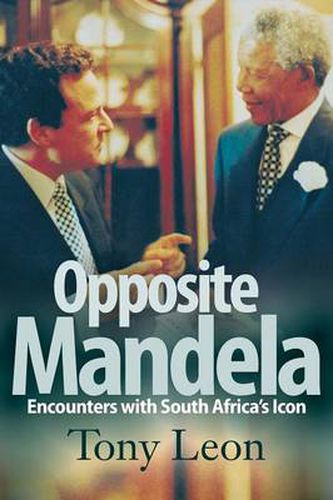Readings Newsletter
Become a Readings Member to make your shopping experience even easier.
Sign in or sign up for free!
You’re not far away from qualifying for FREE standard shipping within Australia
You’ve qualified for FREE standard shipping within Australia
The cart is loading…






This title is printed to order. This book may have been self-published. If so, we cannot guarantee the quality of the content. In the main most books will have gone through the editing process however some may not. We therefore suggest that you be aware of this before ordering this book. If in doubt check either the author or publisher’s details as we are unable to accept any returns unless they are faulty. Please contact us if you have any questions.
Tony Leon has written a book of unique insight into an unexplored aspect of the presidency and leadership of Nelson Mandela. Opposite Mandela relates the untold stories of how South Africa’s first democratic president related to his political opponents. Leon served as leader of the Democratic Party during Mandela’s presidency. Although they clashed, sometimes fiercely, on great issues of the day, Leon enjoyed an unusually warm relationship with Mandela and had direct access to the president’s office. In this first-hand account, he relates some of the more consequential moments of those momentous times in South Africa’s history-in-the-making through the lens of the opposition. Although this is a personal account, it also explores some of the major themes, from reconciliation to corruption, which not only marked that period but also laid the basis for the current challenges which confront South Africa today, nearly two decades after Mandela assumed the countrys highest office, the very moment when Leon’s political leadership began. Insightful, and simultaneously serious and amusing, it lifts the veil on many unknown or unexplained benchmarks from that era: the personal animosity between Mandela and FW De Klerk, the decision of the Democratic Party to reject Mandela’s offer of a seat in his cabinet and whether the extraordinary outreach of Mandela to the minorities was the shrewd calculation of a latter-day Machiavelli or the genuine impulses of a secular political saint. This highly readable and first-hand account considers in a balanced manner both the golden moments and the blind spots of one of the most consequential presidencies and leaders of the modern democratic age.
$9.00 standard shipping within Australia
FREE standard shipping within Australia for orders over $100.00
Express & International shipping calculated at checkout
This title is printed to order. This book may have been self-published. If so, we cannot guarantee the quality of the content. In the main most books will have gone through the editing process however some may not. We therefore suggest that you be aware of this before ordering this book. If in doubt check either the author or publisher’s details as we are unable to accept any returns unless they are faulty. Please contact us if you have any questions.
Tony Leon has written a book of unique insight into an unexplored aspect of the presidency and leadership of Nelson Mandela. Opposite Mandela relates the untold stories of how South Africa’s first democratic president related to his political opponents. Leon served as leader of the Democratic Party during Mandela’s presidency. Although they clashed, sometimes fiercely, on great issues of the day, Leon enjoyed an unusually warm relationship with Mandela and had direct access to the president’s office. In this first-hand account, he relates some of the more consequential moments of those momentous times in South Africa’s history-in-the-making through the lens of the opposition. Although this is a personal account, it also explores some of the major themes, from reconciliation to corruption, which not only marked that period but also laid the basis for the current challenges which confront South Africa today, nearly two decades after Mandela assumed the countrys highest office, the very moment when Leon’s political leadership began. Insightful, and simultaneously serious and amusing, it lifts the veil on many unknown or unexplained benchmarks from that era: the personal animosity between Mandela and FW De Klerk, the decision of the Democratic Party to reject Mandela’s offer of a seat in his cabinet and whether the extraordinary outreach of Mandela to the minorities was the shrewd calculation of a latter-day Machiavelli or the genuine impulses of a secular political saint. This highly readable and first-hand account considers in a balanced manner both the golden moments and the blind spots of one of the most consequential presidencies and leaders of the modern democratic age.